Google I/O 2025: AI Search Shake-Up & Ranking Volatility

Kishan Panpalia, Founding Team, Pepper
Google I/O 2025 introduced game-changing AI search features—and the organic rankings are already feeling the impact. If your Google traffic felt like a roller coaster after these announcements, you’re not imagining it. Major AI-driven updates dropped, and the SERP (search engine results page) has been in flux, causing Very High volatility in rankings. For marketers, SEOs, business owners, and tech professionals, this isn’t just another Google update—it’s a fundamental shift in how search works.
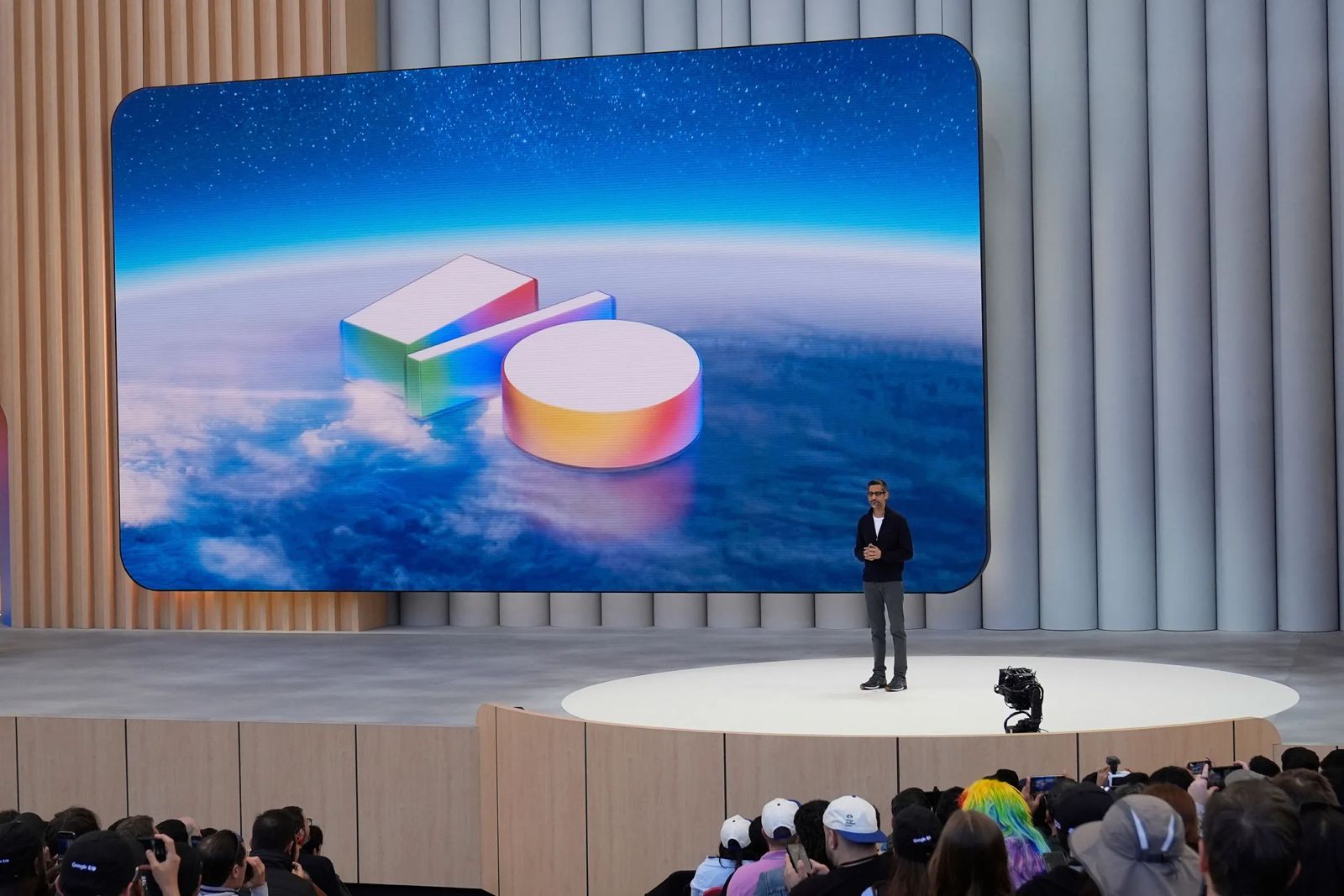
Google’s New AI-Powered Search Features at I/O 2025
Google unveiled a suite of AI-driven search enhancements aimed at making search more intelligent and interactive:
- AI Mode rollout: Google is rolling out AI Mode to all U.S. search users, integrating a Gemini-powered chatbot into search. This mode can synthesize information from multiple sources, answer follow-ups, and provide conversational results right within Google.
- “Agentic” Search (Project Mariner): An agentic search capability is now built into AI Mode, meaning the search AI can perform tasks on your behalf. Google demonstrated it booking travel plans and hunting down concert tickets autonomously. This is a big step toward search that doesn’t just find information – it acts on it.
- Live Search (Project Astra): Google is making search multimodal and real-time. With Search Live, users can now have a conversation with Google or even search by pointing their phone’s camera at an object. This bridges Google Lens and voice search into a live, interactive experience – think of it as searching by talking and showing, not just typing.
- Expanded AI Overviews: Those AI-generated summary answers at the top of results (AI Overviews) are becoming ubiquitous. Google announced at I/O that 1.5 billion users see AI Overviews in search results each month. In fact, Semrush data shows 13.14% of all queries triggered AI Overviews in March 2025, up from 6.49% in January – a massive jump in a few months Google is clearly ramping up these AI summaries across more queries.
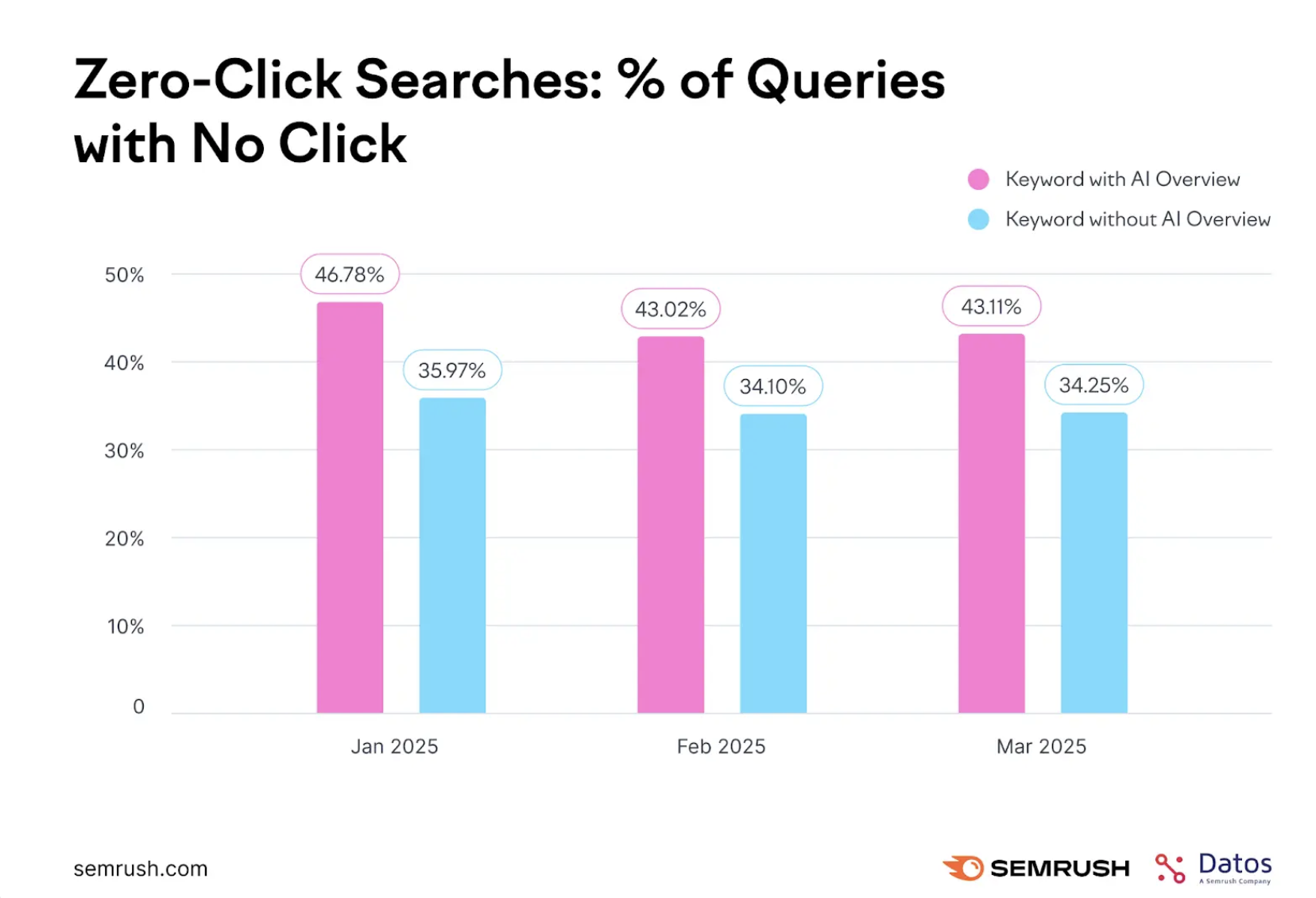
Post-I/O Ranking Turbulence: Data on the “Googlequake”
Such radical changes haven’t come quietly. In the days around Google I/O 2025, search rankings became extraordinarily volatile. SEO forums lit up with chatter about rankings “zigzagging,” and numerous tracking tools corroborated the turmoil. Semrush Sensor, for example, hit a volatility score in the Very High range (~9.2–9.3/10) around May 20–21 – essentially a “Googlequake” level of turbulence. Other SERP monitors like MozCast and RankRanger likewise spiked well above normal levels, indicating significant algorithmic flux.
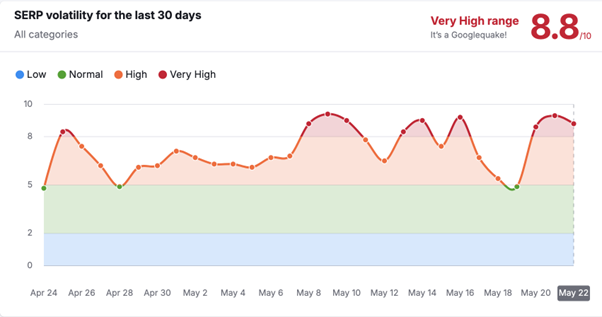
Semrush Sensor’s volatility chart for April–May 2025 shows a dramatic spike (reaching “Very High” volatility) around the time of Google I/O. This kind of surge – 9.2+ on the scale – is rare and typically signals major ranking shake-ups
Notably, this volatility follows a pattern of unconfirmed Google updates throughout April and early May, but the post-I/O spike stands out. One industry roundup observed sharp ranking fluctuations on May 12–13 and again on May 16 leading up to I/O
Then, right as I/O announcements rolled out, “many of the tools [showed] super heated volatility” in Google’s results. In plain terms, rankings were bouncing unpredictably – some sites saw sudden surges in traffic, while others plunged overnight.
It’s important to note Google has not confirmed an algorithm update here. However, the concurrence of I/O’s AI feature rollouts and these ranking tremors is hard to ignore. As one report noted, a Sensor score in the 9+ range “often lines up with Google testing or pushing new changes live”. In other words, the AI-driven changes are likely contributing to (or coinciding with) these ranking swings, whether through direct algorithm tweaks or indirect shifts in user behavior.
Why This Matters: Impact on Organic Visibility and User Behavior
For anyone who relies on Google for visibility, the implications of these AI-driven changes are profound. Organic search as we know it is being redefined:
- AI answers reduce traditional clicks: AI Overviews attempt to answer users’ queries directly on the SERP, before they even click a result. As these rich answers expand, we’re likely to see more zero-click searches – users get what they need without visiting a website. In fact, Google’s own AI can now handle complex queries with “Deep Search,” issuing dozens of sub-searches to synthesize a comprehensive answer. This means even highly detailed questions might be fully answered by Google’s AI, siphoning off traffic that used to go to content publishers.
- Users are searching differently: With conversational AI available, people are asking more complex, multi-step questions and expecting nuanced, cited answers. Queries might become longer and more conversational (“what’s the best way to do X given Y?”) rather than just keyword strings. This favors comprehensive, well-structured content over thin SEO filler. High-quality, niche content that addresses specific sub-questions can actually gain more visibility now, because the AI will pull in those insights as part of larger answers. Conversely, shallow content that doesn’t contribute real value will be filtered out by the AI.
- Trust and authority are paramount: Google’s AI is under pressure to provide reliable answers. As a result, it’s doubling down on sources with strong E-E-A-T (Experience, Expertise, Authority, Trust) signals. “Citation and trust signals matter more” now – content with clear author expertise, good reputation, factual accuracy, and structured data is more likely to be referenced or cited by the AI. If your site has those credibility markers (expert authors, schema markup, quality backlinks), you stand a better chance of being featured in AI-driven results. If not, you may get overlooked in favor of a more authoritative source.
- New search behaviors and expectations: Features like Live Search indicate users will engage with search in more interactive ways – using voice, images, and real-time context. Visual and conversational search is poised to grow. Google Lens usage is already huge (over 1.5 billion monthly visual searches per Google’s data). As searchers get comfortable with these modes, content that isn’t optimized for visual or voice discovery could lose out. Similarly, if Google’s agentic AI can complete tasks (like booking a reservation) right from the search interface, users might skip visiting multiple websites. One outcome the industry anticipates: even more “zero-click” scenarios, as AI agents complete tasks without users ever clicking through to a site. This is great for user convenience, but it raises the stakes for businesses to be visible in that AI-driven transaction or recommendation.
In short, Google’s AI-infused search can boost sites that are authoritative and content-rich, but it can also bypass sites by answering queries or executing tasks directly. The traditional SEO playbook—get to rank #1 and reap the clicks—won’t guarantee traffic when Google’s AI might deliver answers or actions straight on the SERP.
How to Stay Resilient: Strategies for an AI-Driven Search Era
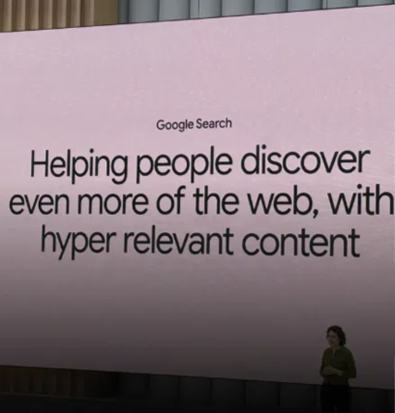
In this new landscape, adaptability and strategy are everything. Here are key moves to help you stay visible and relevant as Google’s search evolves:
- Optimize for AI visibility, not just rankings: Ensure your content can be easily understood and utilized by Google’s AI. That means using clear structure (headings, lists, schema markup) and providing accurate, well-sourced information. Content that the AI trusts will get summarized or cited. Being part of an AI Overview is a win – even if it’s a zero-click result – because it keeps your brand in the conversation. Focus on high-quality, granular content that answers specific questions in depth, as this is more likely to be pulled into AI responses. Also, double-check your facts and cite sources where appropriate; an AI that “double-checks” will favor content with evidence of reliability.
- Provide what AI can’t: unique insight and experience: As AI summarization becomes ubiquitous, think about the gaps it can’t fill. AI tends to aggregate common knowledge. So, differentiate your content with original research, expert opinions, case studies, or interactive tools. These are things that don’t distill easily into a generic AI blurb. For example, an AI might give the overall steps to solve a problem, but your site can offer a personalized calculator, a community forum, or a fresh perspective. In a world of AI-generated overviews, content that offers a distinct point of view or deeper engagement will stand out. Users (and even Google’s algorithms) will seek out sources that bring something new to the table.
- Embrace a hybrid SEO approach: The search results page is no longer just 10 blue links – it’s a mix of AI answers, people-also-ask questions, videos, images, local results, and more. To stay visible, optimize across these elements. For instance, ensure you have content that could appear in People Also Ask, featured snippets, or video carousels. Treat multimodal SEO (text, images, video, audio) as essential. Google’s multimodal Live Search means visual SEO (image alt text, schema for images/videos, mobile-friendly design) is now as important as keyword optimization. By covering your bases (traditional SEO and AI/vertical results), you increase the chances of capturing traffic from some part of the SERP, even if another part is taken over by AI.
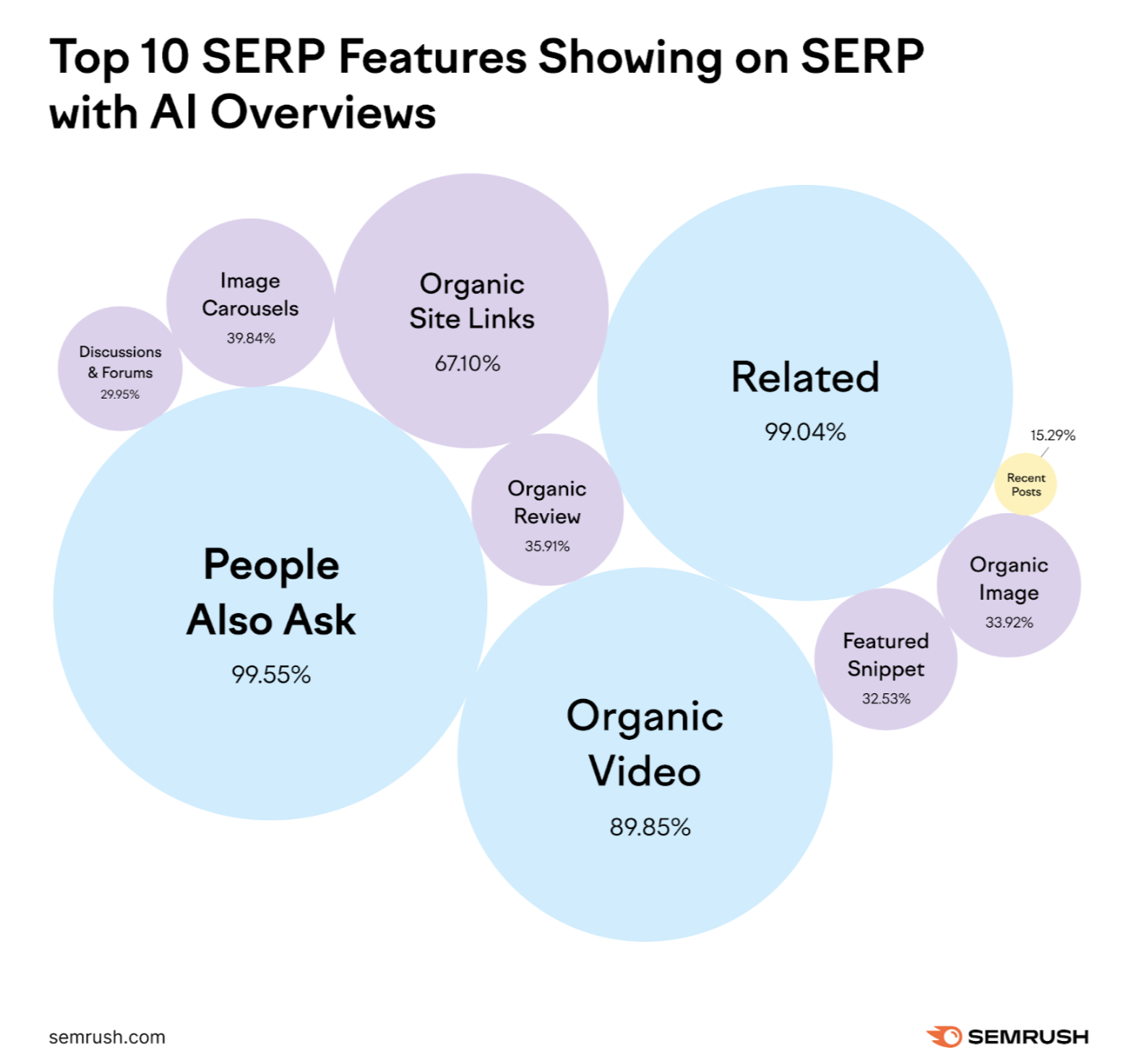
- Double down on E-E-A-T and authority: This is not new advice, but it’s never been more critical. Invest in your site’s credibility. Highlight author credentials on content. Get quality backlinks and mentions that signal authority. Keep content updated and accurate. Use structured data to help Google identify your site’s important details (organization info, author profiles, review ratings, etc.). In an AI-driven world, Google will heavily favor sources it trusts. Strong E-E-A-T can be the difference between your content being the one the AI summarizes versus being invisible. Remember, Google’s AI might answer the user directly, but it still needs trustworthy content to draw from – make sure you’re in that pool.
- Make your website machine-friendly: As Google’s agentic search (e.g. Mariner) starts performing actions, your site should be prepared. Websites must be machine-operable. This means technical SEO and UX matter in new ways. Ensure your site structure is clean and crawlable so AI agents can navigate it. Optimize forms and checkout processes to be simple (an AI might abandon a complex form). Implement APIs or feeds for things like inventory or scheduling if applicable – those could feed Google’s future integrations. In short, if an AI agent tried to use your site to complete a task, would it succeed? Think about that for e-commerce (can it add an item to cart easily?), for lead generation (is your form easy to find and fill?), and so on. Sites that play well with AI task automation could become preferred sources for Google’s agentic functions.
Finally, stay agile and informed. Monitor Google’s updates and SERP behavior closely – tools like Semrush Sensor, MozCast, etc., are your early warning system for volatility. When the ground shifts (and it will, often), analyze what changed: Which pages dropped or gained? Did certain query types get an AI overhaul? Use that data to adjust your SEO and content strategy. The companies and marketers that thrive in this era will be those who treat SEO as a fast-moving target, not a set-and-forget tactic.
Google’s evolution toward AI-centric search is rewriting the rules of search marketing. We’re witnessing the beginning of an AI-first search era where ranking volatility is the price of innovation. Rather than panic, savvy marketers should see this as a signal to elevate their game. Focus on creating genuinely valuable, trustworthy content and user experiences that align with these new AI-driven paradigms. If we can adapt to how Google’s search is changing – staying user-centric, technically sharp, and data-informed – we can remain resilient (and even find new opportunities) in the face of continuous AI-driven search evolution. The SEO playbook might be changing, but one principle holds true: those who deliver real value to users will always have a place in the results, no matter how Google presents them.
Latest Blogs
Explore how Google’s 2025 AI search updates triggered ranking chaos. Learn actionable strategies to adapt your SEO for AI Overviews, zero-click searches, and SERP volatility. Stay ahead now.
Learn how to rank on AI search engines like ChatGPT, Perplexity, and Gemini by optimizing your content for authority, structure, and relevance. Stay ahead in AI-driven search with this strategic guide.
Explore the best healthcare SEO services for your medical practice. Improve online visibility and effectively reach more patients in need of your services.
Get your hands on the latest news!
Similar Posts
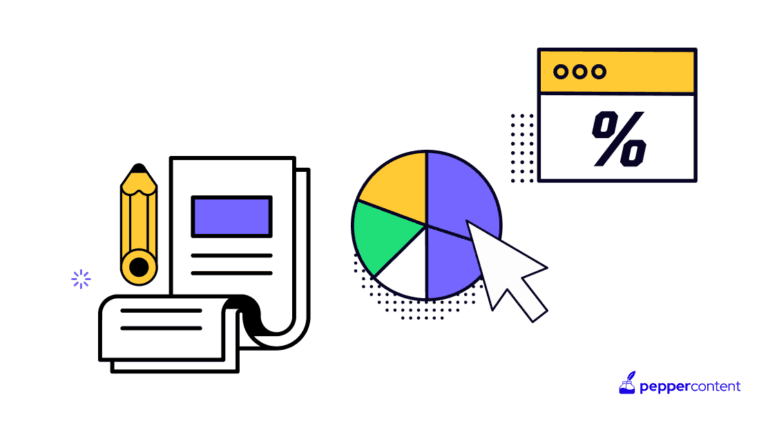
Content Analytics
5 mins read
How to Check Google Rankings: 3 Swift and Accurate Methods
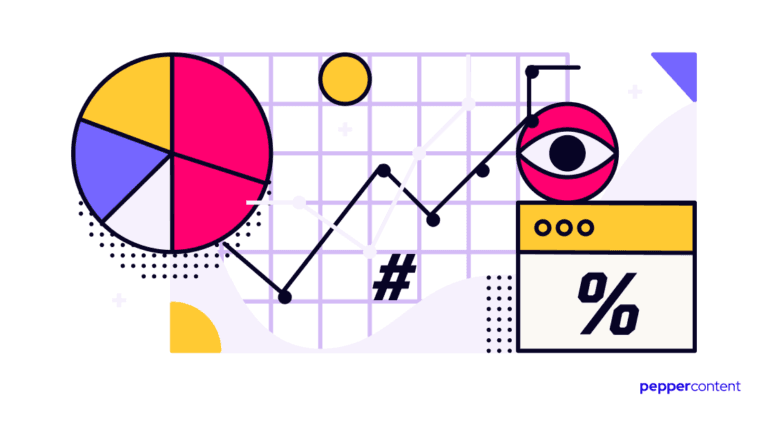
Content Analytics
9 mins read
How to Measure Content Marketing Effectiveness
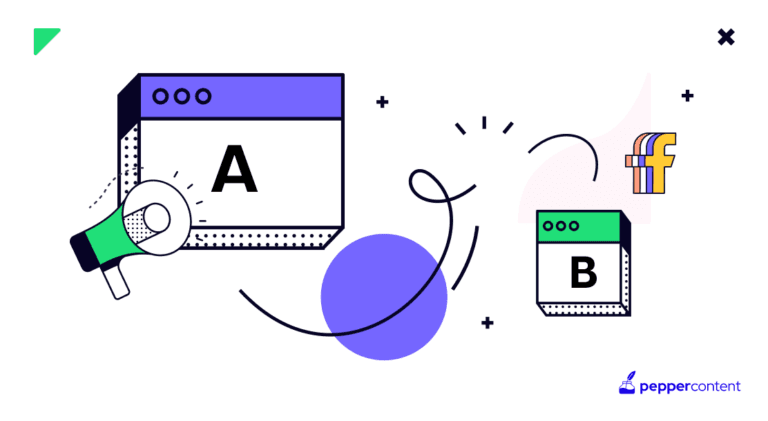
Content Analytics
5 mins read